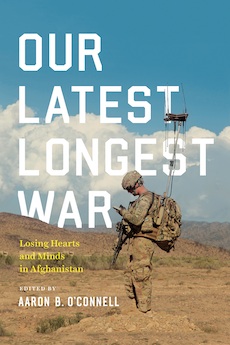By Louis J. Kern
This volume offers a comprehensive editor’s introduction and nine articles addressing specific aspects of America’s war in Afghanistan—war aims, strategies, relations with the Afghan people and government, co-operation with allies, nation building policies, and attempts to transform Afghan society. Authors are predominantly field-grade military officers with advanced academic training who served in Afghanistan; two are female, one is Afghani, and one is a career diplomat. An essential glossary of acronyms is appended.
As the sub-title suggests, there is an explicit comparison of the Afghan and the Vietnam wars. Ironically, strategic planners and general officers had intensively studied the failures of Vietnam—e.g., Gen. David H. Petraeus’ Ph.D. dissertation (Princeton, 1987) on its lessons and implications for future conflict. Why, then, did they repeat earlier errors, and how did specific Afghani conditions frustrate their best efforts?
In 2001 the U.S. had limited goals: the pursuit and elimination of Al Qaeda and Osama Ben Laden. In order to prevent Afghanistan’s reversion to a safe haven for terror, American strategy shifted from counter-terrorism to counter-insurgency (expelling the Taliban) and establishing a stable nation state with a sound economic infrastructure, i.e., nation building, a policy that would also fail in Iraq.
The events detailed here resemble a Greek tragedy with America as the flawed hero, constrained to act in accordance with seemingly sanctified, immutable principles in conflict with stubborn reality, ultimately done in by its own hubris. At the heart of American policy was the belief in the universality of the liberal, centralized democratic state that provided security and social services to its population. Afghanistan had never had such a government, and its tribal rivalries, war lordism, rampant corruption, religious intolerance (as a Sunni-Hanafi dominated culture), and gender inequality made it infertile ground for its transplantation. Presumptive American exceptionalism insured a model polity that guaranteed that the government seat would be the modernized, urban Kabul that was unable to impose its policies on the rural, traditional tribal areas. U.S. assumptions, habitual practices, and ingrained attitudes hindered and obstructed the realization of basic goals: complex, overlapping levels of bureaucracy; military-civilian competition; lack of coordination with coalition allies; the militarization of policy decisions and reconstruction efforts (that paralleled the contemporary militarization of police in the U.S.); excessive reliance on high technology; insistence on quantifiable results; ignorance of Afghani history, culture, and social organization; and the injection of exorbitant amounts of money as a quick solution to problems.
The war spanned the years 2001 to 2014, and in its final stage (the transition to Afghani autonomy), the policies of the military (counterinsurgency) were gradual, while those of the White House were geared to rapid disengagement. In the end there were some tangible benefits for Afghanistan in infrastructure, health care, and education. But the total cost of the war is estimated to have approached $1 trillion; 58,736 Afghan civilians died and 335,400 were internally displaced. Some 2,216 Americans died and 20,000 were wounded.
This is a technical text; we learn little about wartime soldier experience. A good counterpoint to this book is David Wood’s What We Have Done: The Moral Injury of Our Longest Wars (2016). Finally, the authors conclude, despite acute awareness of failures in Vietnam, “the United States just never escaped the prison of its culture or quit the habits of mind . . . operative in American society long before either war began.” And that “cultural myopia” resulted in a failed intervention and insured that Operation Enduring Freedom was “a massive and avoidable waste of time, lives, and resources.”
Louis J. Kern (ΦBK, Clark University,1965) is professor emeritus of history at Hofstra University. Hofstra University is home to the Omega of New York chapter of Phi Beta Kappa.




